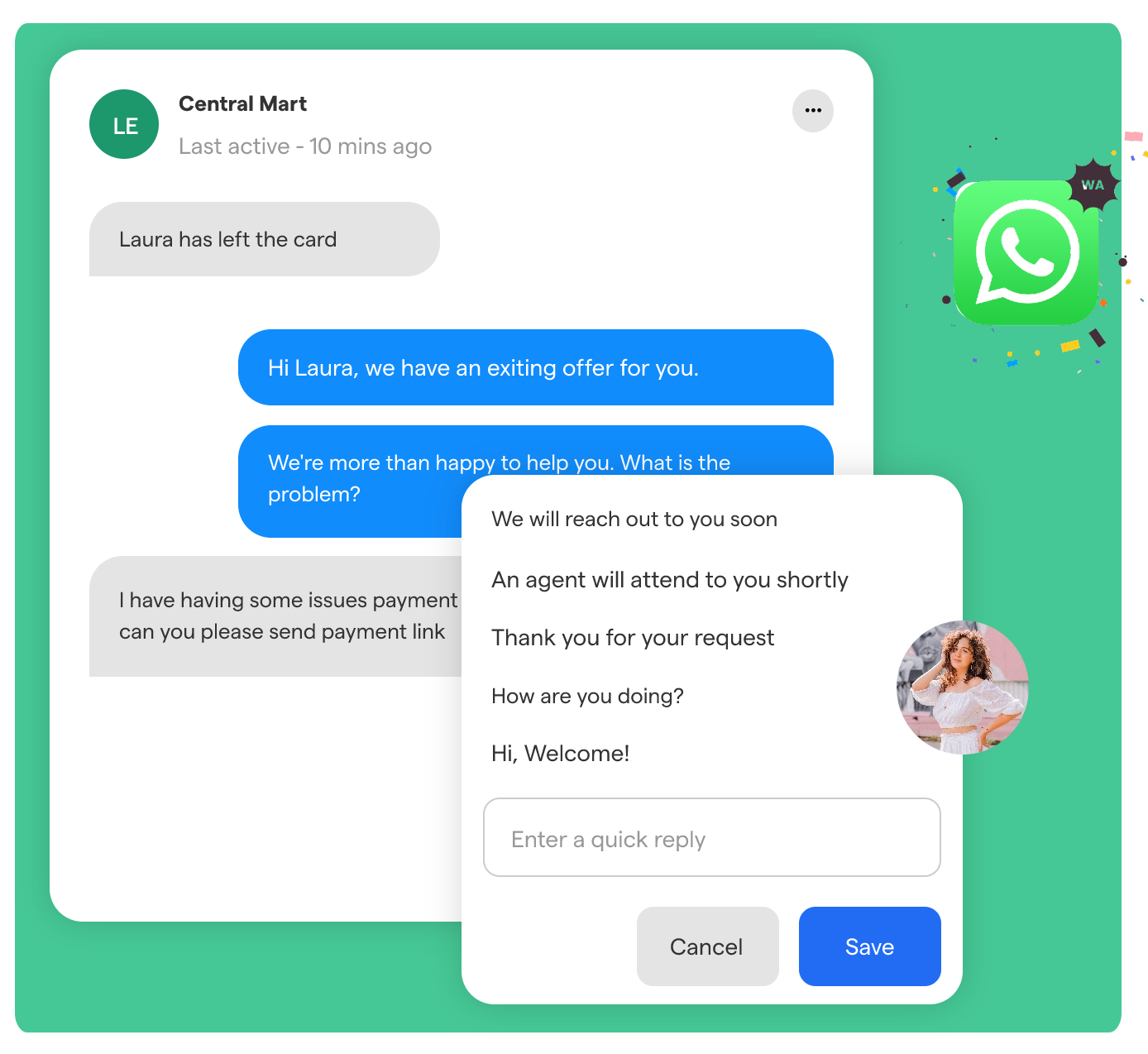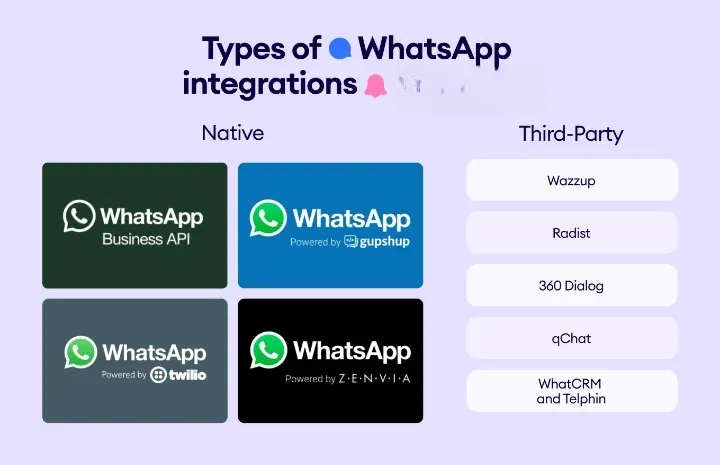Are you looking to streamline your WhatsApp data management process?
Well, you're in luck because we've got just the solution for you: WhatsApp integrations!
By seamlessly linking these two powerful tools, you can now achieve a whole new level of data organization and collaboration, all while keeping the conversation casual and friendly.
Over 2 billion people use WhatsApp to connect and communicate, making it one of the most popular messaging platforms. At the same time, CRMs and other Applications has become the go-to choice for businesses regarding data management. So, combining these heavy hitters only makes sense!
Imagine transferring data from your WhatsApp conversations directly into your CRMs without manual input or switching between multiple apps. It's like magic!
Plus, with the ability to share and collaborate on your CRMs in real-time, you and your team can work together, making updates and analyzing data and leads no matter where you are.
So, get ready to experience the smoothest data link you've ever encountered.
The Basics of WhatsApp Integrations
As how businesses communicate with their customers continues to evolve, WhatsApp integration has become an increasingly important tool in their arsenal.
In this section, we'll explore WhatsApp integration, how it works, and the benefits it brings to businesses.
What is WhatsApp Integration?
Simply put, WhatsApp integration is connecting your WhatsApp Business account with third-party applications or tools.
It allows businesses to integrate the messaging app into their existing customer service or support workflows, making communicating with customers via the app easier.
Understanding How It Works
There are three main ways to integrate WhatsApp into your business:
WhatsApp API: It lets businesses integrate WhatsApp into their existing CRM, ERP, or other software, allowing them to send and receive messages from the app using their systems.
WhatsApp Business API: For larger businesses with high messaging volumes, this option gives them access to additional features like customer support, increased message templates, and more.
WhatsApp Business App: A free-to-use app for small businesses to help them interact efficiently with their customers. It enables quick and secure messaging and automated replies.
The Benefits of Integrating WhatsApp into Your Business
There are many great benefits to integrating WhatsApp into your business. Some of the main ones include:
Improved Customer Engagement: WhatsApp integration allows businesses to interact with customers instantly in a conversational way that feels natural and less intimidating than traditional methods.
Increased Efficiency: By integrating WhatsApp with your business processes, customer service can become more efficient and streamlined, making it easier for agents to handle more customers with fewer mistakes.
Cost-Effective Communication: WhatsApp is a low-cost communication channel that can save businesses money on customer support and sales.
Types of WhatsApp Integrations
WhatsApp integrations offer businesses the flexibility to enhance customer communication and streamline processes. This section explores the different types of WhatsApp integrations available and how they can benefit businesses.

Third-party Integrations
Integrating WhatsApp with third-party applications can help businesses leverage additional features and capabilities. Some popular third-party integrations include:
Live Chat Integration
Integrating WhatsApp into your website's live chat feature enables real-time conversations with visitors.
It provides a convenient way for customers to ask questions, receive instant support, and make inquiries.
An omnichannel chatbot platform, like BotPenguin, would be the best solution to provide Live Chat accessibility to your customers.
CRM Integration
Integrating WhatsApp with your existing CRM platform allows you to manage customer interactions more efficiently.
It enables the consolidation of customer data, chat history, and messaging analytics, providing a holistic view of customer interactions.
BotPenguin’s no-code integration is perfect for connecting your WhatsApp with CRMs like HubSpot, GoHighLevel, Salesforce, & more.
Payment Gateway Integration
By integrating WhatsApp with a payment gateway, businesses can send payment links or request payments from customers directly through WhatsApp.
This integration simplifies the payment process, making it convenient for customers to complete transactions.
Google Sheets Integration
Integrating WhatsApp with Google Sheets can automate the process of recording and organizing data.
Businesses can capture important information from WhatsApp conversations and automatically populate it into designated Google Sheets, saving time and reducing manual data entry.
Team Integration
Team integration allows businesses to create WhatsApp groups for internal teams, enhancing collaboration and communication.
It instantly lets team members share updates, files, and important information, promoting a cohesive and productive work environment.

In-house Integration
For businesses with specific needs and requirements, in-house integrations provide the flexibility to build custom solutions. Here are two common approaches:
Building a Custom Solution
Businesses can tailor their WhatsApp integration to their unique needs by developing personalized solutions.
This involves leveraging the expertise of developers to create a custom application or system that aligns with specific business objectives.
API Development
API development allows businesses to create bespoke tools and functionalities using WhatsApp's API capabilities.
This approach provides greater control over the integration process, allowing businesses to extend WhatsApp's functionality to suit their requirements.
How to Implement WhatsApp Integrations?
Implementing WhatsApp integrations can greatly enhance your business communication and streamline your processes.
In this blog post, we'll explore the steps in successfully implementing WhatsApp integrations, from planning to execution.
Planning the Integration Process
Before diving into integration, it's essential to take the time to plan the process thoroughly. Here are some key considerations:
Assess Your Business Needs
Start by identifying your business objectives and determining the specific goals you want to achieve through WhatsApp integration.
This will help you choose the right integration option and ensure it aligns with your overall strategy.
Analyze Your Communication Workflow
Evaluate your existing communication channels and workflows to identify areas that can benefit from WhatsApp integration.
Consider how WhatsApp can improve customer support, team collaboration, and overall customer experience.
Choosing the Right Integration Option
Once you have a clear understanding of your business needs, it's time to select the most suitable integration option. Here are some factors to consider:
Evaluate Third-Party Integration Providers
Research third-party integration providers and assess their features, compatibility, and customer reviews.
Look for providers that offer functionalities that align with your specific requirements.
Explore In-house Integration Options
If your business requires custom capabilities, consider building an in-house integration.
Assess whether you have the internal resources and expertise to develop a custom solution or if hiring external developers is necessary.
Key Factors to Consider During Implementation
During the implementation phase, it's important to consider the following factors to ensure a successful integration:
Technical Compatibility
Ensure that your integration option is compatible with your existing systems and software.
Coordinate with your IT team or external developers to ensure seamless integration.
User Training and Adoption
Invest in training and resources to support user adoption of the new WhatsApp integration.
Provide clear instructions and resources to help your team members understand how to use the integrated features effectively.
Monitoring and Evaluation
Regularly monitor and evaluate the performance of the WhatsApp integration for customer support.
Collect feedback from users and customers to identify areas for improvement and optimize the integration for better results.
Common Challenges & How to Overcome Them
As a business owner or entrepreneur, you may face many challenges that hinder your success. Whether dealing with technical, security, or marketing challenges, you can take control of the situation and overcome these obstacles.
Technical Challenges
Technical challenges regarding website development, software installation, and hardware setup can arise.
These challenges can have various impacts, including slowing down operations, affecting productivity, and decreasing business performance. Below are some tips for overcoming them.
Invest in Reliable Technology
To prevent technical challenges, it's essential to invest in reliable technology. This means ensuring you have the hardware, software, and other equipment to handle your business needs.
Refrain from relying on outdated or cheap technology that may not fully meet your requirements.
Hire Experienced IT Professionals
Having an IT team that manages and maintains your technology is crucial. Technical challenges can be complex, and having an experienced IT professional can save you time and money.
This person can detect problems before they occur, prevent cybersecurity challenges, and quickly resolve any issues that do arise.
Security Challenges
Running a business also comes with security challenges like cyber threats and data breaches. These challenges can lead to stolen client data, reputational damage, and financial losses.
The following are ways to overcome security challenges.
Protect your Data
One of the essential things that you can do is ensure that your data is protected.
One way to do this is by using robust cybersecurity programs that detect and prevent malware, phishing attacks, and other threats.
Also, ensure your employees follow proper security protocols to avoid exposing sensitive data.
Get Insurance
It's worth noting that data breaches can still happen, even with the best security measures. Having cybersecurity insurance can help protect your business from the costs associated with data breaches.
Marketing Challenges
Marketing challenges regarding brand recognition, lead generation, and social media engagement can occur.
These challenges can prevent you from growing your business and reaching your target customers. Here are some tips for overcoming marketing challenges
Understand your Customers
To overcome marketing challenges, it's important to understand your customers' needs. This understanding will help you develop a marketing strategy tailored to their preferences.
Spend time analyzing customer data to determine their preferences and behaviors.
Have Clear Goals
Having clear marketing goals can help you focus on what's most important.
Whether building brand awareness, generating leads, or increasing social media engagement, having well-defined goals can help you measure your progress and ensure that you are on track.
Suggested Reading:
Conclusion
In wrapping up, integrating WhatsApp into your business operations can truly change the game, making communication with customers and team members smoother than ever. With its widespread global usage, WhatsApp offers a fantastic opportunity for businesses to connect more effectively and simplify their processes.
By making the most of WhatsApp's integration features, you can automate customer communication, provide personalized support, and create seamless user experiences. This means happier customers and stronger relationships with your audience.
Discover the possibilities of WhatsApp integration with BotPenguin's AI chatbot solutions! Improve customer engagement, streamline team collaboration, and enhance your business communications. It's all about boosting productivity and driving growth with this powerful combination.
Ready to shake things up in your messaging strategy? Give BotPenguin's WhatsApp integration a try today! Elevate your customer experience, save time, and build stronger connections. Don't miss out on this opportunity to optimize your business communications. Get started with BotPenguin now and stay ahead of the curve!
Frequently Asked Questions (FAQs)
What are the key benefits of integrating WhatsApp with CRM systems?
Integrating WhatsApp with CRM systems enables businesses to centralize customer interactions, access comprehensive customer data, and provide personalized messaging for effective customer relationship management.
How can WhatsApp integrations help businesses streamline customer support?
WhatsApp integrations enable businesses to automate responses, provide instant support, and manage customer queries efficiently, resulting in enhanced customer satisfaction and streamlined support processes.
Can WhatsApp integrations facilitate targeted marketing campaigns?
Absolutely! With WhatsApp integrations, businesses can send personalized messages, deliver targeted offers, and engage with customers directly, allowing for more effective and impactful marketing campaigns.
Can WhatsApp be integrated with e-commerce platforms?
Integrating WhatsApp with e-commerce platforms allows businesses to provide personalized order updates, support customer inquiries, and even enable seamless transactions within the WhatsApp messaging interface.
What role does chatbot integration play in WhatsApp messaging?
Chatbot integration in WhatsApp messaging automates responses, provides instant customer support, and can handle routine inquiries, freeing human agents to focus on complex issues and personalized interactions.


